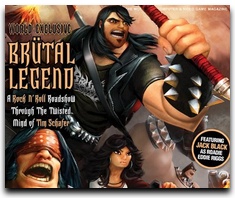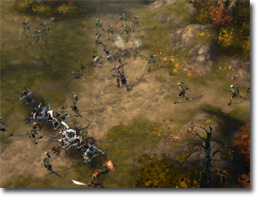 David Braben, founder of Frontier Developments, says retail outlets that buy and sell pre-owned games are “essentially defrauding the industry.” Although multiplayer gaming might not be a huge threat, the single player experience in games may die out because gamers play the game quickly and resell it back to places like GameStop for others to buy.
David Braben, founder of Frontier Developments, says retail outlets that buy and sell pre-owned games are “essentially defrauding the industry.” Although multiplayer gaming might not be a huge threat, the single player experience in games may die out because gamers play the game quickly and resell it back to places like GameStop for others to buy.
Developers don’t get a dime when a game goes traded, many gamers will “share” the single player experience with a single copy of the game by reselling it over and over. The end result, retail outlets make a good penny for marking up old games while developers see nothing. This is really how game retail outlets survive because the margins on video games is so damn low.
The story has been heard before, developers want a piece of the action so they’re taking steps to entice people to keep the game with renewed downloadable content on old games; you can’t experience the new content without keeping the game around longer. In the world of low margin games, high cost development and short-lived story lines the solutions to this problem aren’t exactly obvious.
Braben’s idea of a solution is to offer two versions of the game, a not for resale/rental version at a high price, say $160, and a low priced version that cannot be shared (heavily DRM’ed?) for $50. In essence, gamers would no longer be able to trade in games because the idea of spending double for a game so you can resell it makes no sense to most gamers (including myself.)
Imagine, spending double for a game to be stabbed in the back at a GameStop for getting a quarter of its worth to be resold for almost MSRP again. Sounds like a great time. Not really. Although rental stores may be the exception to the rule, as it’s not a standard gamer, having them pay more for the title isn’t in their best interest as things are going fine for them now.
One major reason rental stores exist is because gamers cannot afford to buy every game they want to play. If rental stores were gone, gamers wouldn’t go out and buy ten games a quarter because they have no choice… they’ll just play less games. If gamers play less games there is a great chance they won’t experience your cool games, like Frontier Development’s Lost Winds, at all.
If a gamer never gets the chance to experience your game because they can’t rent them, you’ll find them less loyal and less likely to purchase your games in the future. As a gamer, I may rent a game because I’m not going to risk buying a product I can’t return and don’t like. However, if I do indeed love the game I may go out and purchase it for real or consider a buy on the sequel. Remember, most retail stores have a exchange-only policy once you’ve unwrapped the title (exchange for the SAME title that is.)
Rental outlets exist because they arrived to fill a demand to experience games, movies and entertainment on the cheap. The entertainment industry is full of great products and experiences but the wallet is limited in its ability to pay for said entertainment. Consider it a way to market your games to the masses and find more creative ways to draw them in and want to own it.
Market your potential sequels in the initial title, make gamers fall in love with the single player story and add a desire to purchase future titles. Give the gamer a behind-the-scenes movie in the game box or on the disc so they can feel a personal tie with the makers of the game and show them your crew is more than a simple logo; make gamers want to like your studio and share in the experience that went into making it. DVD’s have been doing this for years, what about games?
Don’t expect retail outlets and game players to feel bad for your inability to make money on your games. You made the decision to get into development so lie in the bed you made. It’s not fraud, it’s reality and consumers have been trading products for thousands of years, Craig’s List wouldn’t be where it is today if there wasn’t a constant demand for trading products to save a little cash.
(Thanks, 1up)

 It’s clear publishers like Electronic Arts hate to take risks on video games. They’re not alone in their opinion, look how many sequels we’ve got for the holidays compared to new creative titles like Little Big Planet, or how publishers push out sequels to hot titles until we can’t take it anymore; how many Guitar Hero titles will arrive before we scream “enough!”?
It’s clear publishers like Electronic Arts hate to take risks on video games. They’re not alone in their opinion, look how many sequels we’ve got for the holidays compared to new creative titles like Little Big Planet, or how publishers push out sequels to hot titles until we can’t take it anymore; how many Guitar Hero titles will arrive before we scream “enough!”?

So I guess me buying a game and then loaning it to a friend when I am done playing is also “fraud” I guess if I sell my car, that is “fraud” against the maker of the car. How dare the original buyer not be the only owner. The idea that the maker of any product get paid when somebody sells it to another person is just ridiculous. I agree completely with the writer of this article, and David Braben is just plain wrong.
So I guess me buying a game and then loaning it to a friend when I am done playing is also “fraud” I guess if I sell my car, that is “fraud” against the maker of the car. How dare the original buyer not be the only owner. The idea that the maker of any product get paid when somebody sells it to another person is just ridiculous. I agree completely with the writer of this article, and David Braben is just plain wrong.
I understand his frustrations and his point of view, he’s a developer and wants to make a living at it.
I just think that this requires a more creative way of solving the problem them consumer strong arming and brute force using the almighty (or not so mighty?) dollar.
No, it’s not easy to solve. But neither is fusion, the invention of the combustion engine or climbing mount Everest. I just think the industry has to put their thinking cap on and find a better solution.
I’ve run a video game retail store, it’s a rough business, extremely hard to turn a profit. You’ve got to move games quickly and in high volume to make any money.
If you are able to make more than USD $5.00 selling a video game on the Internet you’re doing well – it’s too competitive. You can make double that in a brick-and-mortar store but you’re also paying headcount, electricity and rent too.
I understand his frustrations and his point of view, he’s a developer and wants to make a living at it.
I just think that this requires a more creative way of solving the problem them consumer strong arming and brute force using the almighty (or not so mighty?) dollar.
No, it’s not easy to solve. But neither is fusion, the invention of the combustion engine or climbing mount Everest. I just think the industry has to put their thinking cap on and find a better solution.
I’ve run a video game retail store, it’s a rough business, extremely hard to turn a profit. You’ve got to move games quickly and in high volume to make any money.
If you are able to make more than USD $5.00 selling a video game on the Internet you’re doing well – it’s too competitive. You can make double that in a brick-and-mortar store but you’re also paying headcount, electricity and rent too.
Jesus, for real?!?! Then shut down Goodwill, Salvation Army, every consignment store in America and ebay for reselling peoples crap ’cause Abercrombie and Fitch doesn’t get their share. This is a stupid argument. If you want people to buy and keep your product then make it worth buying and keeping!! Instead of whining and complaining, spend your time working on your trade! I work in used car sales and GM and Ford aren’t protesting at my door asking for their share of my money. What a freaking lame argument.
Jesus, for real?!?! Then shut down Goodwill, Salvation Army, every consignment store in America and ebay for reselling peoples crap ’cause Abercrombie and Fitch doesn’t get their share. This is a stupid argument. If you want people to buy and keep your product then make it worth buying and keeping!! Instead of whining and complaining, spend your time working on your trade! I work in used car sales and GM and Ford aren’t protesting at my door asking for their share of my money. What a freaking lame argument.
They would if they could, trust me. There’s no way to DRM or put a trackable code on old sneakers or jackets (yet). :p
They would if they could, trust me. There’s no way to DRM or put a trackable code on old sneakers or jackets (yet). :p
Having limited disposable income (which has in today’s economy dwindled to almost none), I simply can’t afford to buy games at their retail price, leaving me three choices:
1. Watch the sale ads.
2. Wait a year or thre e for the regular price of the game to drop.
3. Buy it used.
(Okay, so a fourth option is to receive it as a gift, but that’s not a very “proactive” solution.)
Also, I’m a packrat and never sell back my games. I still have games that will not run on any of my computers (except maybe through DOSBox. But even that won’t help the ones on floppy disks from the late 80’s…)
Having limited disposable income (which has in today’s economy dwindled to almost none), I simply can’t afford to buy games at their retail price, leaving me three choices:
1. Watch the sale ads.
2. Wait a year or thre e for the regular price of the game to drop.
3. Buy it used.
(Okay, so a fourth option is to receive it as a gift, but that’s not a very “proactive” solution.)
Also, I’m a packrat and never sell back my games. I still have games that will not run on any of my computers (except maybe through DOSBox. But even that won’t help the ones on floppy disks from the late 80’s…)
You can also rent games.
You can also rent games.